#California Employment Law
Explore tagged Tumblr posts
Text
Employment Law Thought Exercise | 9-1-1 on Fox and the Season 3 Lawsuit Arc
There has been a lot of discussion and debate among fans of the hit tv show regarding this particular plotline. Today, we’re going to talk about Disability Discrimination laws and Reasonable Accommodations and how they are explored on the show.

*This is not meant to be any kind of legal advice or even as serious as our articles. It’s just for fun! Not only does fiction not always line up properly with reality, but also our firm does not handle government employees. This is just going off of standard federal and California employment law. Anyone with more information on city employees or specifically the real LAFD, feel free to join in!*
Buck was injured on the job
He went on leave, and when he was cleared by his doctors to go back, he had a right to be reinstated to his previous position or one equal to it.
Due to the nature of his job, his employer required him to undergo recertification. It appeared to be the same standard type of qualification test that all trainees undergo to ensure they are qualified for the job. He passed, and he was reinstated.

So far, so good
Then, before returning to work, he experienced a pulmonary embolism and was put on blood thinners indefinitely. He was deemed unable to return to his previous position and was offered the choice to go back on leave or take a temporary light duty position. At the time, he tried to quit. He is very lucky for many reasons that Bobby did not take that seriously.
Light duty is considered a reasonable accommodation. In fact, the fire marshal position would likely have paid better than a firefighter position. But Buck wanted to be a firefighter again, and so he argued that there must be some kind of reasonable accommodation to put him back in the field.
Which brings us to the phrase “Undue Hardship”
While on blood thinners, less severe injuries could be life threatening. When this is explained to him, Buck argues that if that happened, there would be multiple paramedics around him. The thing that he is not taking into account there is that those paramedics are there to attend to the civilians that they are rescuing in the first place.
We see this later in Season 6 when Buck is gravely injured, and Bobby has to call in another house to come take care of the fire they were fighting at the time. This example does also point out that yes, this is an accepted risk of the job and does happen from time to time.
The issue is the extremely increased risk of it happening when a firefighter is on blood thinner medication. And Bobby knowing how many risks Buck already takes on the job. Sure, Bobby knows that Buck knows his limits. But Buck is not taking into account that his limits are a lot lower while on those meds. (Which is something that seems to finally hit home in the following Halloween episode.)
Bobby is essentially arguing that accommodating Buck’s disability in the field would create an undue hardship to the team, splitting their resources and his own focus.
Illegal Discrimination

Buck tries to sue for Wrongful Termination, specifically Constructive Termination. He points out that several other members of his team have faced injury and hardship and were able to come back to work with no problem. This actually works against his argument a little bit, but one could argue that it was discrimination against the specific disability, as it was the medication itself that was the issue. However, it could then be argued that it was a valid concern. The motivation behind not allowing Buck back on the team yet was not that he was disabled, but that his disability created a very real and serious risk to himself in the field that could not be reasonably accommodated.
Does Buck have a case? Maybe. Is it a strong one?
His employer followed standard and reasonable protocol
His employer gave reassurances that his position would be held for him to come back when he was ready (and you know Bobby would have put that in writing if Buck had asked)
The medication Buck was on posed a real safety issue
His employer gave him a temporary light duty position that could even be seen as a promotion
Buck has a documented history of acting recklessly and disobeying orders in the field that would support Bobby’s concern
Would the city have settled so quickly and for so much in real life? Who knows.
Would any of this have gone down this way in real life? Who knows. That’s what happens when you mix fact and fiction. Procedurals often tend to start with truth and reality and then alter it to suit the story. It can be interesting to work it backwards and try to see how the story can be applied to reality. This brings up several questions such as:
Did Buck ever send a detailed discrimination complaint to Human Resources?
Did Buck ever call the chief after finding out it was Bobby’s decision not his?
Did Buck ever file a claim with the EEOC or CRD?
Did Buck ever file a grievance through his union?
Did Buck ever contact his union rep at all?
Does Buck even know that he HAS a union?
Could all of this have been avoided if Buck had just spent ten minutes researching California Employment Law?

Bonus Fun Fact!
For those who might not know, when the lawyer is first introduced, and Hen tells him “You might wanna wait until they’re in the ambulance before you start chasing it” she’s not just calling him out on doing something awful, she’s calling him out on doing something illegal. California is one of 21 states (including Texas for Lone Star fans who were wondering) that has laws against ‘ambulance chasing’ – when attorneys solicit clients at accident scenes or in hospitals. In the other 29 states, it is still considered unethical by the Bar Association.
California in particular has strict laws and regulations about when, where, and how attorneys are permitted to advertise. Which reminds me: If you are a California employee and were terminated after being injured at work, call Mesriani Law Group today for a free consultation.
#911 fox#Evan Buckley#Buck#Disability Discrimination#California Employment Law#Wrongful Termination#Constructive Termination#Employment Lawyers#California Attorneys
26 notes
·
View notes
Text
I work at a vote center in California and we can register you provisionally, and you can vote same day, even if you're from a different county within the state California! So if you're still in CA but traveling outside your home county during election season, you can still vote in person at a vote center if you didn't already get the chance to vote another way.
I don't think we can help if you're from out of state though since everything would be different on the ballot.
We're excited to have people vote and hope you all get the chance to do so.
Friendly reminder that almost half of the states in the U.S. have same day registration! This means you can go to the polling center for your location, register there, and cast your vote same day. So if you are over 18, are a U.S. citizen, and live in one of the states listed below, it is not too late to register and vote! I’m going to put notes for some of the states where voting is extra important due to the political climate of the state.
California
Colorado
Connecticut
D.C.
Hawaii
Idaho
Illinois
Iowa - recent polls indicate state could flip from red to blue
Maine
Maryland
Michigan
Minnesota
Montana
Nevada
New Hampshire
New Mexico
New York
North Carolina - swing state! Could go red or blue
North Dakota - voter registration not required
Utah
Vermont
Virginia
Washington
Wisconsin - swing state! Could go red or blue
Wyoming
You can go here for more info on voter registration
I also have a huge list of voting resources here
#voting#us politics#california#one more day!#we can do this!#also please be patient with your poll workers#we're doing our best and have to follow strict procedures to ensure a fair and accurate election#sometimes doing it right takes time#so if you can. go to the polls early#get time off work if you can (CA law requires employers to give you 2hr off on election day)#and encourage your friends to vote too!#we have loads of propositions this year#lots more than just president going on.
15K notes
·
View notes
Text
"In Sacramento, California, an estimated 6,615 people are experiencing homelessness, a number that — while still heartbreakingly high — has declined 29% since 2023, according to the latest Point In Time counts.
But a new project, which has been in the works since 2022, might bring that number down even lower.
A new 13-acre property purchased by Sacramento County will soon be home to the Watt Service Center and Safe Stay.

The county broke ground on the mixed-use service center this week, which will provide shelter, emergency respite, safe parking, health services, and more to community members who are unsheltered — meaning they don’t have a place to safely sleep at night.
“We wanted to do something that is not only larger, but a large-scale campus to provide more than just the shelter,” Janna Haynes, of the county’s Department of Homeless Services and Housing, told KCRA3 News.
The Watt Service Center will have amenities to help meet the needs of anyone staying there, including bathrooms, showers, laundry, and food, as well as mental health, treatment, and employment services.
“You can also meet with your case manager, get behavior health services, look for a job, get rehousing services, a place for your dog,” Jaynes added. “It’s really everything you need, not only for your day-to-day life, but to hopefully end your homelessness.”
While the center is a costly offering, the city explained that it is ultimately less expensive than allowing the homelessness crisis to go unmitigated.
The land was purchased for $22 million and will cost an estimated $42 million to construct the center. According to ABC10 News it will be mostly funded by the American Rescue Plan Act.
While the center will have the capacity to host 225 beds in Safe Stay cabins, 50-person capacity in Safe Parking, and 75-person capacity for emergency/weather respite beds, it will serve countless others outside of the 350 total people it can house at any given time.
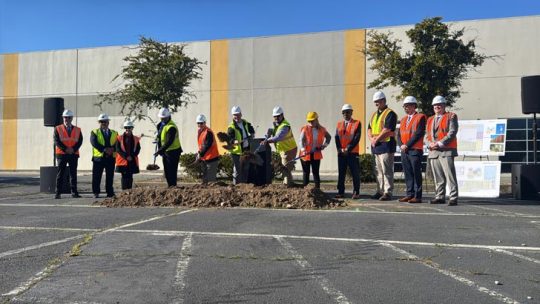
According to a press release from the county, “conservative estimates” have found that over the course of 15 years, the center will serve 18,000 people.
In 2017, the city found that the average cost for an “unsheltered individual” was about $45,000 a year, considering public systems like county jail, shelters, behavioral health, and more.
With the projected impact of the shelter, that cost lowers to less than $3,600 per person.
“If you break down the funding, it’s actually not that expensive,” Rich Desmond, county supervisor for District 3, told ABC10.
“It’s a heck of a lot cheaper than letting someone stay out in the community, unsheltered where they are extremely expensive in terms of the emergency response from fire, our emergency rooms, our law enforcement response.”
Providing what the county calls “wraparound services” not only brings down costs but truly helps people meet their basic needs.
“The really great thing about this site in particular, that we don't have at any other shelters, is the sheer size and the ability to really wrap everything people need,” Emily Halcon, director of the Department of Homeless Services and Housing with Sacramento County, told ABC10.
One notable feature is the center’s Safe Parking spaces, which are the first of their kind in the city. People living in their cars will now have a safe place to park, monitored by security.
“We know a lot of people who are unsheltered actually are living out of their cars,” Desmond said, “maybe a family that’s barely hanging on but they still need that vital transportation to get their kids to school or get to work.”
This support is especially helpful for those who are newly homeless, Halcon added, building on the amenities provided in the county’s two other “safe stay” facilities.
While Sacramento County just broke ground on the Watt Service Center, officials say they hope to begin moving people into the facility in January 2026.
“Our staff is putting in extra time and attention to this campus, ensuring that it houses everything we need to end homelessness for people,” Desmond said in a statement.
Once it’s up and running, Jaynes told KCRA3, they plan to onboard formerly unhoused community members as part of the staff at the facility.
“When you have a conversation with someone who understands where you’ve been, and you see the success they’re having now,” Jaynes said, “it really does give you hope something could be different.”
-via GoodGoodGood, January 24, 2025
10K notes
·
View notes
Text
How Can You Request for Humanitarian Reinstatement After a Visa Petition Denial?
When a visa petition is denied due to the petitioner’s death, hope isn’t lost. You may still have the option to request for humanitarian reinstatement, allowing your petition to be reconsidered based on compassionate grounds. This process can be complex, and having the right legal support can make all the difference. At Rocket Immigration Petitions, we offer the guidance you need, including online immigration lawyer consultation to help navigate this sensitive process.
What is Humanitarian Reinstatement?
Reinstating a petition: If your visa petition was denied because the petitioner passed away, you can apply for humanitarian reinstatement to have it re-evaluated.
Compassionate grounds: USCIS may consider family ties, financial hardships, or other compassionate reasons when reviewing your request.
Applicable cases: This option is generally available to beneficiaries of approved Form I-130 petitions for family-based immigration.
Why Request Humanitarian Reinstatement?
Family reunification: It offers a second chance to reunite with family members despite the unfortunate circumstances.
No need to start over: Reinstatement allows you to pick up where your original application left off, avoiding the need to file a new petition.
Potential for quicker resolution: With a valid reinstatement request, you may experience a faster process compared to starting from scratch.
How Can Online Immigration Lawyer Consultation Help?
Expert guidance: At Rocket Immigration Petitions, we offer online immigration lawyer consultation to help you understand the humanitarian reinstatement process, eligibility criteria, and required documentation.
Avoid mistakes: Filing a reinstatement request can be complicated. A lawyer ensures all paperwork is completed accurately, reducing the chance of errors.
Tailored advice: Every case is unique, and an experienced immigration lawyer can provide personalized advice to improve your chances of approval.
Key Steps for Requesting Humanitarian Reinstatement
Prepare a compelling case: Clearly explain your compassionate reasons for seeking reinstatement, supported by detailed documentation.
Seek legal advice: An online immigration lawyer consultation ensures you understand the legal process and increases your chances of success.
Stay informed: USCIS guidelines can change, so it’s essential to stay updated on the latest requirements for humanitarian reinstatement.
Conclusion
Requesting a humanitarian reinstatement can be a lifeline for families affected by the death of a petitioner. By working with Rocket Immigration Petitions and utilizing online immigration lawyer consultation, you can ensure the best possible outcome for your reinstatement request. Let us guide you through this challenging process and help you reunite with your loved ones.
#Rocket Immigration Petitions#Criminal Waiver Training Course Access Packet#perm training course access packet#Attorney Drafted Immigration Petitions#medical waiver training course#USC Spouse Petitioning Spouse#humanitarian reinstatement sample letter#marriage petition to us citizen#petition for sibling#immigration attorney in california#immigration petitions#Permanent Residency Applications#Lawful Permanent Resident Spouse#Nonimmigrant Visa Petitions#Employment Based Petitions#u visa attorney near me#u visa#best immigration lawyer near me#green card non immigrant visa#U.S. Immigration Law#lawful permanent resident spouse
0 notes
Text
California Legislature Sends Governor Bill Prohibiting Employer ‘Captive Audience’ Meetings
On August 31, 2024, the California Legislature passed the California Worker Freedom from Employer Intimidation Act, Senate Bill (SB) No. 399. The bill heads to Governor Gavin Newsom, who has until September 30, 2024, to sign it. If he does so, the act will add new Labor Code Section 1137. Quick Hits California’s SB 399 would limit an employer’s ability to communicate with employees regarding…
#business#California law#California legislation#California legislature#California Worker Freedom from Employer Intimidation Act#captive audience meetings#Employment Law#government#governor newsom#legal
0 notes
Text
... California has some surprisingly strict labor laws, including overtime starts if you work more than 8 hours in a day, not if you work more than 40 hours in a week, so this will be interesting.

Mcfucking EXCUSE ME
[pissvortex tweet]
[Link 1]
[Link 2]
Screenshots featured in tweet



26K notes
·
View notes
Text
Women's Not So Distant History
This #WomensHistoryMonth, let's not forget how many of our rights were only won in recent decades, and weren’t acquired by asking nicely and waiting. We need to fight for our rights. Here's are a few examples:

📍 Before 1974's Fair Credit Opportunity Act made it illegal for financial institutions to discriminate against applicants' gender, banks could refuse women a credit card. Women won the right to open a bank account in the 1960s, but many banks still refused without a husband’s signature. This allowed men to continue to have control over women’s bank accounts. Unmarried women were often refused service by financial institutions entirely.
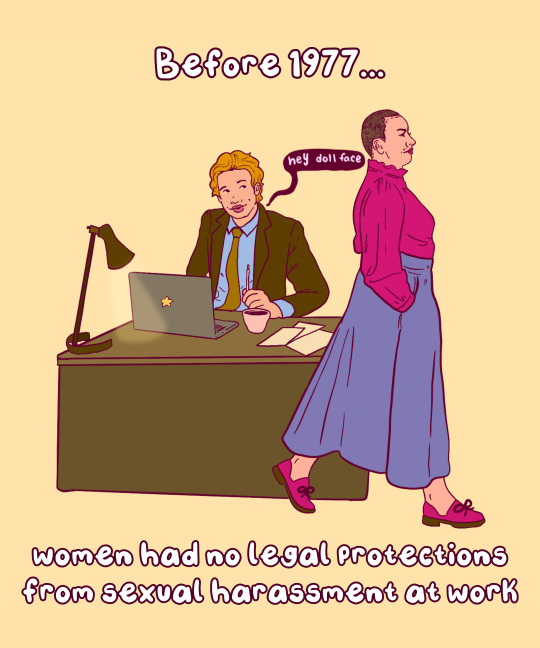
📍 Before 1977, sexual harassment was not considered a legal offense. That changed when a woman brought her boss to court after she refused his sexual advances and was fired. The court stated that her termination violated the 1974 Civil Rights Act, which made employment discrimination illegal.⚖️
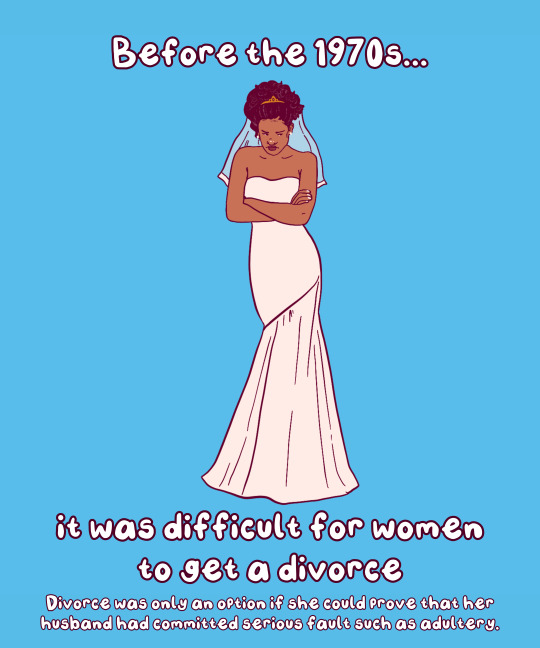
📍 In 1969, California became the first state to pass legislation to allow no-fault divorce. Before then, divorce could only be obtained if a woman could prove that her husband had committed serious faults such as adultery. 💍By 1977, nine states had adopted no-fault divorce laws, and by late 1983, every state had but two. The last, New York, adopted a law in 2010.
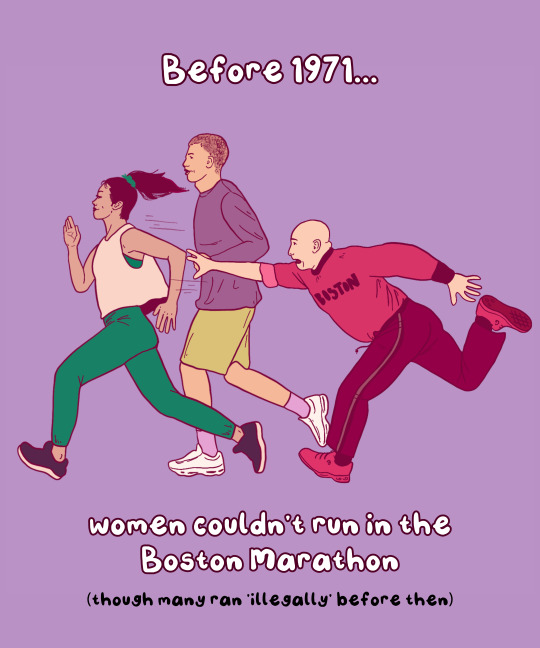
📍In 1967, Kathrine Switzer, entered the Boston Marathon under the name "K.V. Switzer." At the time, the Amateur Athletics Union didn't allow women. Once discovered, staff tried to remove Switzer from the race, but she finished. AAU did not formally accept women until fall 1971.

📍 In 1972, Lillian Garland, a receptionist at a California bank, went on unpaid leave to have a baby and when she returned, her position was filled. Her lawsuit led to 1978's Pregnancy Discrimination Act, which found that discriminating against pregnant people is unlawful

📍 It wasn’t until 2016 that gay marriage was legal in all 50 states. Previously, laws varied by state, and while many states allowed for civil unions for same-sex couples, it created a separate but equal standard. In 2008, California was the first state to achieve marriage equality, only to reverse that right following a ballot initiative later that year.

📍In 2018, Utah and Idaho were the last two states that lacked clear legislation protecting chest or breast feeding parents from obscenity laws. At the time, an Idaho congressman complained women would, "whip it out and do it anywhere,"
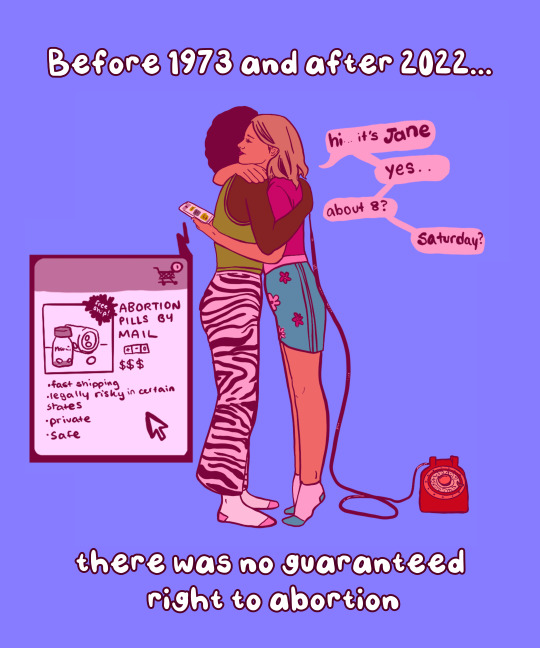
📍 In 1973, the Supreme Court affirmed the right to safe legal abortion in Roe v. Wade. At the time of the decision, nearly all states outlawed abortion with few exceptions. In 1965, illegal abortions made up one-sixth of all pregnancy- and childbirth-related deaths. Unfortunately after years of abortion restrictions and bans, the Supreme Court overturned Roe in 2022. Since then, 14 states have fully banned care, and another 7 severely restrict it – leaving most of the south and midwest without access.
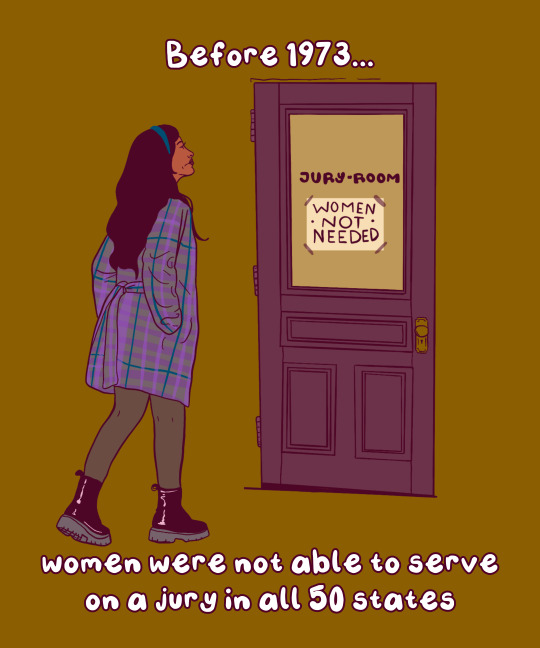
📍 Before 1973, women were not able to serve on a jury in all 50 states. However, this varied by state: Utah was the first state to allow women to serve jury duty in 1898. Though, by 1927, only 19 states allowed women to serve jury duty. The Civil Rights Act of 1957 gave women the right to serve on federal juries, though it wasn't until 1973 that all 50 states passed similar legislation

📍 Before 1988, women were unable to get a business loan on their own. The Women's Business Ownership Act of 1988 allowed women to get loans without a male co-signer and removed other barriers to women in business. The number of women-owned businesses increased by 31 times in the last four decades.
Free download
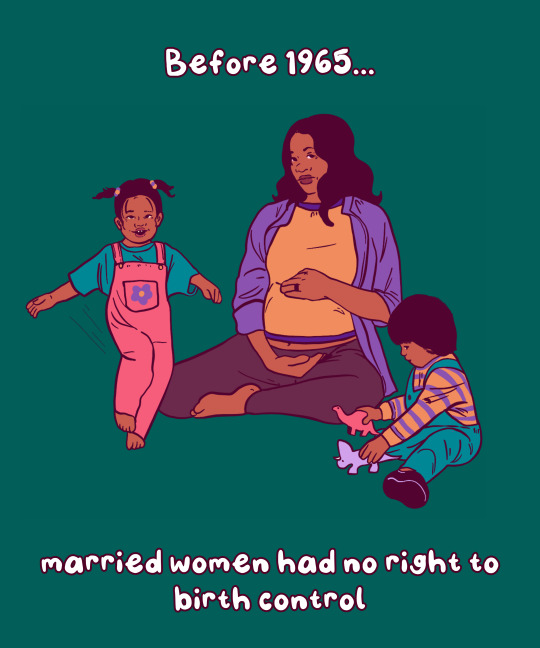
📍 Before 1965, married women had no right to birth control. In Griswold v. Connecticut (1965), the Supreme Court ruled that banning the use of contraceptives violated the right to marital privacy.

📍 Before 1967, interracial couples didn’t have the right to marry. In Loving v. Virginia, the Supreme Court found that anti-miscegenation laws were unconstitutional. In 2000, Alabama was the last State to remove its anti-miscegenation laws from the books.

📍 Before 1972, unmarried women didn’t have the right to birth control. While married couples gained the right in 1967, it wasn’t until Eisenstadt v. Baird seven years later, that the Supreme Court affirmed the right to contraception for unmarried people.
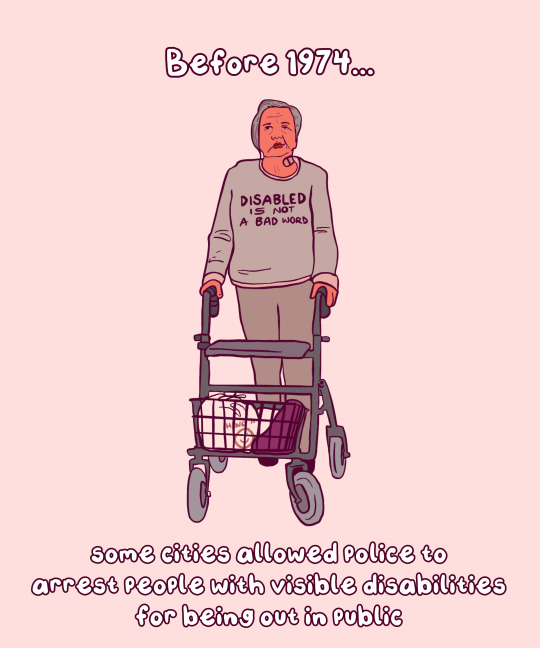
📍 In 1974, the last “Ugly Laws” were repealed in Chicago. “Ugly Laws” allowed the police to arrest and jail people with visible disabilities for being seen in public. People charged with ugly laws were either charged a fine or held in jail. ‘Ugly Laws’ were a part of the late 19th century Victorian Era poor laws.

📍 In 1976, Hawaii was the last state to lift requirements that a woman take her husband’s last name. If a woman didn’t take her husband’s last name, employers could refuse to issue her payroll and she could be barred from voting.

📍 It wasn’t until 1993 that marital assault became a crime in all 50 states. Historically, intercourse within marriage was regarded as a “right” of spouses. Before 1974, in all fifty U.S. states, men had legal immunity for assaults their wives. Oklahoma and North Carolina were the last to change the law in 1993.
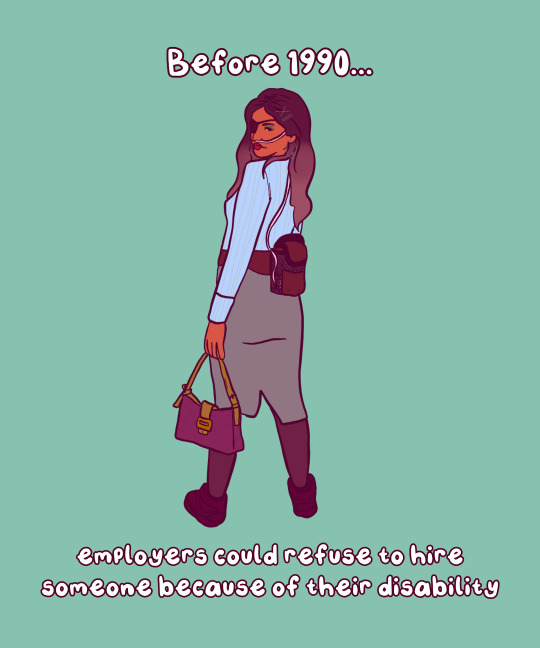
📍 In 1990, the Americans with Disability Act (ADA) – most comprehensive disability rights legislation in U.S. history – was passed. The ADA protected disabled people from employment discrimination. Previously, an employer could refuse to hire someone just because of their disability.
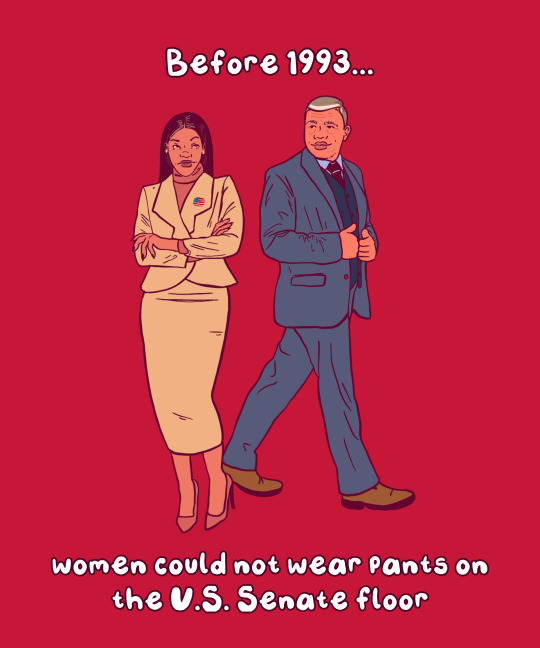
📍 Before 1993, women weren’t allowed to wear pants on the Senate floor. That changed when Sen. Moseley Braun (D-IL), & Sen. Barbara Mikulski (D-MD) wore trousers - shocking the male-dominated Senate. Their fashion statement ultimately led to the dress code being clarified to allow women to wear pants.

📍 Emergency contraception (Plan B) wasn't approved by the FDA until 1998. While many can get emergency contraception at their local drugstore, back then it required a prescription. In 2013, the FDA removed age limits & allowed retailers to stock it directly on the shelf (although many don’t).

📍 In Lawrence v. Texas (2003), the Supreme Court ruled that anti-cohabitation laws were unconstitutional. Sometimes referred to as the ‘'Living in Sin' statute, anti-cohabitation laws criminalize living with a partner if the couple is unmarried. Today, Mississippi still has laws on its books against cohabitation.
#art#feminism#women's history#women's history month#iwd2024#international women's day#herstory#educational#graphics#history#70s#80s#rights#women's rights#human rights
18K notes
·
View notes
Text
California Business Lawyer & Corporate Lawyer
Website Url:
Complete Address:
355 South Grand Ave., Suite 2450, Los Angeles, California 90071 USA
Phone:
(213) 277-7400
Description
Introduction
Welcome to our law firm, where we specialize in providing top-notch employer defense legal services. Our experienced team of attorneys is dedicated to protecting your business interests.
Our Expertise in Employer Defense
At our firm, we pride ourselves on being the go-to employer defense attorneys in California. Our team has extensive experience in defending employers in a wide range of legal matters. Whether you are facing allegations of wrongful termination, discrimination, or wage and hour disputes, we have the knowledge and expertise to protect your rights. Our employer defense lawyers are well-versed in both state and federal employment laws, ensuring that you receive comprehensive legal representation.
Employer Defense Services in Los Angeles
Located in the heart of Los Angeles, our firm is well-equipped to handle employer defense cases throughout the region. Our employer defense attorneys in Los Angeles have a deep understanding of the local legal landscape and are committed to providing personalized legal solutions tailored to your business needs. We represent employers of all sizes, from small businesses to large corporations, and our goal is to resolve disputes efficiently and effectively.
Comprehensive Employment Law Services for Employers
Our firm offers a full range of employment law services for employers. We understand that navigating employment laws can be complex, and our employment law specialists are here to guide you every step of the way. Our services include:
Drafting and reviewing employment contracts
Advising on compliance with state and federal employment laws
Conducting workplace investigations
Representing employers in administrative hearings and court proceedings
We are dedicated to helping employers create a positive and compliant workplace environment.
Corporate Attorneys and Business Lawyers in Los Angeles
In addition to our expertise in employer defense, our firm also provides comprehensive corporate legal services. Our corporate attorneys and business lawyers in Los Angeles are skilled in handling a variety of business-related legal matters. From business formation and mergers to contract negotiations and corporate litigation, we offer strategic legal advice to help your business thrive. Our business attorneys in Los Angeles are committed to delivering results that align with your business objectives.
Business Attorney Services in San Diego
Our reach extends beyond Los Angeles to San Diego, where we offer expert business attorney services. Our San Diego business lawyers are well-versed in the unique legal challenges faced by businesses in the region. We provide legal support for:
Business formation and incorporation
Contract drafting and review
Dispute resolution and litigation
Compliance with local, state, and federal regulations
Whether you are a small business owner or part of a larger corporation, our San Diego business attorneys are here to support your legal needs.
Small Business Legal Support
We understand that small businesses have unique legal needs, and our small business lawyers in San Diego are dedicated to providing tailored legal solutions. We offer a range of services specifically designed for small businesses, including:
Employment law compliance
Contract negotiations
Intellectual property protection
Dispute resolution
Our goal is to help small businesses navigate legal challenges and achieve long-term success.
Why Choose Our Firm?
Choosing the right legal representation is crucial for the success of your business. Here are a few reasons why our firm stands out:
Experience: Our attorneys have decades of combined experience in employer defense and business law.
Expertise: We are specialists in employment law and have a deep understanding of the legal landscape in California.
Personalized Service: We provide customized legal solutions tailored to the specific needs of your business.
Results-Driven: Our focus is on achieving the best possible outcomes for our clients.
Comprehensive Support: From employer defense to corporate law, we offer a full spectrum of legal services.
Our Commitment to Clients
At our firm, client satisfaction is our top priority. We are committed to providing exceptional legal services and building long-term relationships with our clients. Our attorneys take the time to understand your business and provide strategic legal advice that aligns with your goals. We are here to support you through every legal challenge and help your business succeed.
Contact Us
If you are in need of an employer defense attorney or business lawyer in California, look no further. Contact our firm today to schedule a consultation and learn how we can assist you. Our team is ready to provide the legal support you need to protect your business interests.
Conclusion
Our firm is dedicated to providing expert legal representation for employers and businesses in California. With our extensive experience and specialized knowledge, we are your trusted partner in navigating complex legal challenges. Let us help you achieve your business goals and protect your interests with confidence.
#employer defense lawyer 100#employer defense attorney 200#employer defense attorney Los Angeles 90#employer defense attorney California 30#employer defense attorney in CA 20#employer defense attorney in California 20#employer lawyer 1200#employer attorney 500#lawyer employers 200#employment law specialist 200#lawyers for employers 100#employer law attorney 100#employment law services for employers 100#employer defense attorney losangeles 90
1 note
·
View note
Text
#employee#company#ceo#employment#employer#job#work#office#9 to 5#ทำงาน#งาน#call#after work#california#law#สส#นายก#ประเทศไทย#คนไทย#เงิน#money
0 notes
Text
The election doesn’t start tomorrow, it ends tomorrow.
If you haven’t already, please make sure you are registered to vote and know where your polling place is (vote.org is a great and easy way to get that information). Additionally, please make sure you have a way to get to your polling place. Uber and Lyft often give free or discounted rides to the polls, and this year the car rental company, Hertz, is allowing free one-day rentals to get to the polls. More information on that here.
EDIT: NAACP has a discount code to use for Lyft, valid for two rides up to $20 ($40 total). Use code: NAACPVOTE24
The following states allow same day registration for general elections, ie: the presidential election:
California
Colorado
Washington DC
Hawaii
Idaho
Illinois
Iowa
Maine
Maryland
Michigan
Minnesota
Montana
Nevada
New Hampshire
New Mexico
Utah
Vermont
Virginia
Washington
Wisconsin
Wyoming
Note: North Dakota does not require formal voter registration, and upon presenting valid identification at a polling place, eligible citizens receive their ballot to vote.
all info here
The following states are required by law to give you time off to vote (between one and three hours):
Alabama
Alaska
Arizona
Arkansas
California
Colorado
Georgia
Illinois
Iowa
Kansas
Kentucky
Maryland
Massachusetts
Minnesota
Missouri
Nebraska
Nevada
New Mexico
New York
Ohio
Oklahoma
South Dakota
Tennessee
Texas
Utah
West Virginia
Wisconsin
Wyoming
*Most states requiring employers to permit voting leave also require that this time is paid. Among the above, the following do not: Alabama, Arkansas, Georgia, Massachusetts, North Dakota. (info here)
Again, it is your right to vote. If you are in line when the polls close, stay in line. It is your legal right to vote.
If you are turned away at the polls, say the following verbatim: “Give me a provisional ballot with a receipt as required by law.”
If you make a mistake on your ballot, you have the right to ask for a new ballot. Don’t cross anything out, simply ask for a new one.
Poll workers are required to make reasonable accommodations for voters who need, including ballots in other languages or translators.
Canvassing is not allowed at polling places, and no one is allowed to threaten or intimidate voters. You have the right to report anything of the like.
All info taken from here
Some tips:
Don’t wear political merch to the polls.
Don’t engage with anyone about your politics at the polls.
Don’t take phone calls inside your polling place — it can wait, please be respectful.
Research who is running locally and see what their policies are. Additionally, research any local propositions that may be on the ballot. The language on ballots is made to be purposefully confusing, so make sure you read everything carefully in addition to your research.
If you’re able to get up early on Election Day, go right when your polling place opens to beat the line.
REMEMBER: IT IS YOUR RIGHT TO VOTE!
Here are a list of state-by-state voter protection hotlines, as well as hotlines in various other languages:
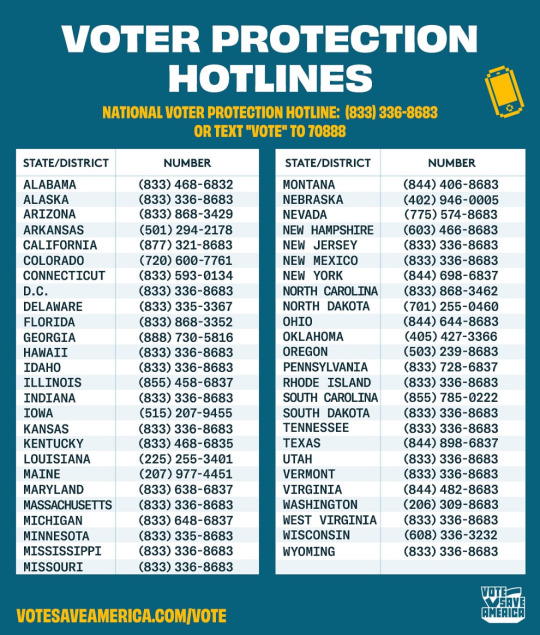
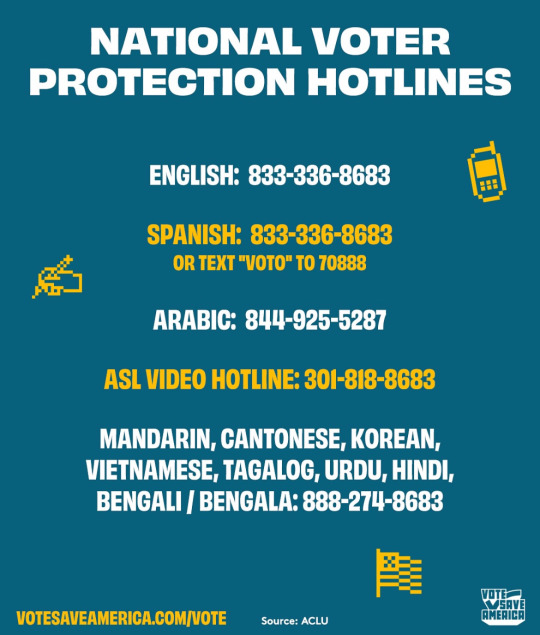
Please vote tomorrow if you have not already. It’s so important, and choosing not to vote or voting for a third party is a vote for extremist measures. Vote down the ballot, and do not let anyone bully you into voting one certain way.
What we are seeing throughout this election cycle (and the last two election cycles) is entirely abnormal. The bullying we see from a certain side and its supporters is childish and dangerous. They spew false information, make racist remarks, and sexualize and discriminate fellow candidates. No single presidential candidate is completely and wholly good, so criticize accordingly.
Vote with those you love in mind, vote with your safety in mind, and vote for those who will be affected for decades to come. Vote for someone who speaks coherently, not for someone who is, let’s be honest, not cognitively alright — and that is the bare minimum of the issue.
If you have anything to add to this post, please do. If anything is incorrect, please let me know and I will gladly change it.
Vote. Vote. Vote.
#voting#2024 presidential election#us politics#politics#united states elections#voting rights#get out the vote#voting information
4K notes
·
View notes
Text
Examples of Reasonable Accommodations in the Workplace
People who have disabilities may sometimes need accommodations. In the context of the workplace, reasonable accommodations are adaptations and changes to environment or procedures that assist disabled workers in performing their job. There are also accommodations that prospective employees may need throughout the hiring process as well. Needs and abilities vary from person to person and therefore so do the accommodations granted to each individual. Many different types of accommodations are relatively easy to provide and most come at no real cost to the employer.
Who is an Individual with a Disability?
When an individual has mental or physical limitations to their ability to perform major life activities, they are considered disabled by the Americans with Disabilities Act and are entitled to reasonable accommodations. When requesting accommodations at work, if the disability is not visibly obvious, the employer may ask for a doctor’s confirmation that the accommodation is necessary.
Types of Workplace Reasonable Accommodations
Reasonable accommodations come in three main categories:
No Tech – Accommodations that require minimum cost and effort. This can include allowing someone more time to complete tasks or letting them eat at their desk.
Low Tech – Accommodations that require a small amount of cost and effort. This can include providing lumbar support for chairs or wrist supports for mice and keyboards.
High Tech – Accommodations that require extra cost and effort. This can include installing automatic door and providing screen readers.
Common Examples of Reasonable Accommodations in the Workplace
There are many ways in which an employer can provide reasonable accommodations for their employees such as:
Alterations – Changing the way a job is performed, the time frame it is performed in, or the people responsible for individual aspects of the job itself.
Equipment – Altering equipment such as chair modifications or changing the display and audio settings on a computer and/or providing devices such as desk heaters or magnifiers.
Help – Allowing personal aids or caretakers to provide assistance.
Materials – Making alterations to the format of provided information.
Parking – Providing accessible parking for employees.
Reassignment – Moving an employee to an equal position that is better suited to their needs.
Scheduling – Allowing for flexibility within an employee’s schedule to allow for extra breaks or time off for doctor’s appointments.
Technology – Providing things such as screen readers, modified headsets, and assistive software.
Job Restructuring
An example of reasonable accommodation may be changing the way a job is performed. This can be done by reassigning workloads amongst different employees, changing the employee’s location, or even removing or replacing certain duties.
Rearranging the way tasks and duties are divided amongst coworkers is one way to reasonably accommodate employees with disabilities. If there are two receptionists and one of them is dyslexic, that employee might handle the majority of helping guests and transferring calls while the other handles the majority of the paperwork and typing.
Some disabilities may prevent people from being able to perform their job in the given work environment, perhaps due to mobility or sensory issues. If the job can be done from home or at a more accessible location, it may be reasonable to allow the employee to do so.
There are also some aspects of the way a job is performed that may be easily eliminated or changed completely. A deaf employee may be allowed to handle correspondences via text and email rather than making phone calls. An employee with mobility issues may be permitted to mail things out rather than making deliveries.
Modified Work Schedules and Flexible Leave Policies
Some disabilities may cause an employee to require a modified schedule. If accommodating that schedule does not cause the employer undue hardship, then it would be considered a reasonable accommodation. This may involve extra breaks, regular days off, or even a part time schedule.
A person with an ongoing illness may require regular days off to receive treatment.
A person with chronic pain may only be able to work every other day or require three day weekends in order to recuperate.
A person with diabetes may require extra breaks to eat and manage their insulin.
There are also some disabilities that may require employees to take a leave of absence for more than a day or two. The employer is not necessarily required to provide paid leave in these situations, but they are expected to allow for disability leave when applicable.
A person with a condition that involves flair ups may need extra time off.
Some treatments may have extended recovery time.
The workplace may be temporarily inhospitable due to a person’s disability.
A person with a prosthetic may need time off for repair or replacement.
A flexible work schedule accommodation may also involve an employee being permitted to work remotely a day or two a week or working weekends instead of weekdays.
Modification or Purchase of Equipment or Devices
There are many accessibility aids that can help someone with disabilities in the workplace. Employers are required to provide reasonable equipment when necessary. However, employers are only responsible for things specifically needed for the job. Accessibility aids required for daily functions such as glasses or hearing aids are the employee’s responsibility.
Employees who are visually impaired may require:
Screen reading software
Braille or raised print copies of documents
Magnifying devices
Additional lighting
Employees who are hard of hearing may require:
Teletypewriters
Text telephones
Transcript software
Employees with mobility issues may require:
Telephone headsets
Modified equipment controls
Modified desks for wheelchairs
Stabilizing devices
Employees with dyslexia or ADHD may require:
Guided reading software
Employees with chronic pain may require:
Modified seating
Training
Employers are required to provide employees with disabilities the same opportunities for advancement as their coworkers. This means ensuring that any training is accessible to everyone. Ways that employers may provide training accommodations include:
Making sure that training sites are accessible
Providing training materials in alternative formats
Including sign language interpreters in presentations
Adding captioning to video/audio guides
Modification of Policies
There are some companies that have policies that may prevent a disabled person from being able to do their job efficiently or safely. These policies would have to be amended or the employee given exemption. Examples of this may include:
A worksite that does not allow animals permitting an employee to bring their service dog
A company with a ‘no eating on the clock’ or ‘no food at your desk’ rule allowing an exception for a diabetic employee
An employee with sensory issues or ADHD being allowed to wear headphones
Modified emergency evacuation plans for employees with mobility issues
A company that only provides on site parking for management providing a space for a lower-level employee with mobility issues
Modification of Physical Site or Building
Sometimes, the way the worksite itself is designed poses a hindrance to disabled employees that their coworkers do not face.
Structural changes are sometimes necessary, such as:
Building ramps
Adding accessible bathrooms
Installing elevators/escalators
Non-structural changes may also provide solutions, such as:
Setting up water coolers
Syncing an alert light to the doorbell
Moving meetings and training to another area
Provision of Readers, Communication Access Providers, or Personal Assistants
Some employees may need accommodations by way of third party assistance. This assistance may be needed occasionally or frequently depending on situation at hand. If providing this assistance does not cause undue hardship to the employer, it is considered a reasonable accommodation.
Readers may be employed to assist employees with vision impairments as well as those with dyslexia or learning disabilities. The reader should be able to comprehend the materials being read so that they can clearly and accurately provide the information.
Sign language interpreters can be especially useful for employees who are hard of hearing and/or mute to easily and clearly convey and receive information with their boss, coworkers, and clients.
Captioners and transcribers may be needed for employees who are hard of hearing or have auditory processing disorder when dealing with video presentations.
Drivers may be provided for vision impaired employees who are required to travel as part of their job.
Personal assistants can help in a myriad of ways such as:
Carrying things for employees whose disability involves a weightlifting restriction.
Retrieving or filing things on high shelves for an employee in a wheelchair.
Performing fine motor functions for those with conditions such as Parkinson’s.
Reassignment to a Vacant Position and Light Duty
Sometimes, an employee may develop a disability during their employment that makes it difficult or impossible to perform the job they were already doing. Sometimes, accommodations can be made. If there are no viable reasonable accommodations that can be provided, the employer may need to reassign them to another position with job duties they would be able to perform.
The reassignment should not be a demotion and should pay the same or a comparable salary. The reassignment should also not conflict with another employee being entitled to the position due to a collective bargaining agreement or any seniority system in place.
Some employers have provisions in place to assign employees to light duty when needed. This is not a requirement under the ADA, but a prudent option for industries that involve heavy labor and/or high risk of injury such as construction, fire departments, and law enforcement. Light duty positions are considered a reasonable accommodation if:
The employee is unable to perform their current job due to disability
The employee is qualified and capable of performing the light duty work
Reassigning the employee to the light duty job would not cause undue hardship
Other Accommodations
Other accommodations and considerations may be needed for employees with disabilities depending on the specific situation.
Some jobs compensate their employees for gas milage when traveling is part of their duties. If an employee can not drive due to their disability, the employer may compensate them for public transportation costs instead.
Employees who have learning disabilities may be provided extra personal training to ensure that they are able to fully grasp the skills needed for their job.
Employees with ADHD may be permitted to use their own organizational system rather than company standard or given more flexibility in how they complete tasks.
Employees may be permitted to join meetings via phone or video chat if their disability prevents them from attending in person.
Workplace Reasonable Accommodation Considerations
The following are all considerations that employers must account for when providing reasonable accommodations.
Cost – Most accommodations require relatively low cost to the employer, and some can be provided at no cost at all. Reasonable accommodations are often far less expensive than anticipated.
Essential Job Functions – While employers are expected to provide reasonable accommodations, they are not required to alter their standards for quality and production.
Providing Accommodation – Employers are not usually expected to provide accommodations unless an employee with a disability requests it.
Selection – If there are multiple accommodations that may provide the same assistance to an employee, the employer is permitted to chose which one they will provide.
Undue Hardship – If providing an accommodation would impose an undue hardship on the employer, such as exorbitant cost or difficulty, then they are not required to provide it.
What Are Essential Functions?
The tasks and duties that make up the foundation of a job are referred to as essential functions. The ability to perform those functions to a satisfactory level is what makes someone qualified to hold the position. An essential function is defined by:
Being the reason the position exists
The skill and expertise necessary
How many employees are able to complete the same tasks
Reasonable Accommodation Process
The ADA and the EEOC maintain that accommodation requests be taken into consideration case by case. First, the employee must inform their employer that they have a disability. Employers are not responsible for accommodating disabilities that they are not aware of. The reasonable accommodation process depends on open communication and cooperation between the employer and the employee.
Requesting Reasonable Accommodations in the Workplace
Every employer has their own procedure for requesting accommodations, usually through a manager or human resources department. The request must state the presence of the disability as well as how the disability prevents the employee from properly doing their job. It is best to make the request in writing and retain a copy for your own records. While it is not necessarily required to use the phrase ‘reasonable accommodation’ or cite the ADA, it is good to be clear and direct.
Obtain Preliminary Documentation
Employers are not entitled to an employee’s entire medical history. However, if an employee is requesting accommodation for a disability that is not obviously evident, the employer may request specific documentation from a healthcare provider confirming the disability and the need for accommodation. It is best to only prove the information absolutely relevant to the accommodation request and not allow the employer unlimited access to medical records.
Employers Responsibility When Responding to Reasonable Accommodation Requests
When an employee submits a request for a reasonable accommodation, they then begin what is known as an interactive process with their employer. This is an open communication between the employee and the person handling the request so that they can come to an agreement as to the best accommodation necessary for the situation. The employee may have specific ideas in mind and the employer may have follow up questions. The employer can request a confirmation from a health care professional that the accommodation is necessary if the disability is not obviously evident. The employer may also wish to review ADA guidelines to be sure of the extent of their responsibility. If the accommodation the employee is requesting is deemed too costly, the employer may want to do research to see if an equal but less expensive alternative is available.
Using JAN as a Tool
In 1983, the Department of Labor’s Office of Disability Employment Policy founded a free service known as the Job Accommodation Network to provide employers with information and guidance regarding job accommodations. Before the ADA was created, this tool established the standard for employer guidance when it came to working with those with disabilities. JAN provides a helpful summary of common problems and possible solutions known as The Employers’ Practical Guide to Reasonable Accommodation under the Americans with Disabilities Act. The guide is frequently updated as new situations are brought to their attention.
Does An Employer Need to Provide the Accommodation Requested?
When an employee informs their employer that their disability is affecting their ability to do their job effectively, the employee may already have an accommodation solution in mind. The employer may choose to provide that particular accommodation, or they might find another equally effective accommodation that may be cheaper or easier to provide.
Furthermore, employers are not required to eliminate any essential functions of the employee’s position. If the employee is unable to perform that function due to their disability, the employer may find them reasonable accommodations or transfer them to another position of comparable pay.
Similarly, employers are not required to provide accommodations that would create an undue hardship on the employer. This is generally in reference to expense and difficulty, taking into consideration the cost in relation to the employer’s finances as well as the impact of providing the accommodation. The definition of what falls under this classification varies between situations as an accommodation that could be easily provided by a large company might impose an undue hardship on a small business.
Employers are also not required to provide employees with personal services and devices needed for everyday functions. Things like glasses and hearing aids may be covered by employer provided health insurance, but they are not considered workplace accommodations.
Implementing Reasonable Accommodations
While there are no exact required guidelines regarding the procedure for implementing an accommodation, it is best practice to move things along quickly and maintain respectful communication. Employers are encouraged to keep perspective on what the employee needs in order to perform their job and not on the disability itself. The employee is often the best person to ask when trying to come up with appropriate accommodations as they know best where the difficulty is and may already have ideas. It can also be beneficial to take the abilities and strengths of individual employees into consideration when assigning job duties.
Monitoring Accommodation Effectiveness
It is important that the employer and the employee work together when implementing an accommodation. The employee best understands their disability and what they need to perform their job. The employer best understands the business and what impacts certain accommodations might have. Ultimately, the employer has final say in how they will accommodate their employees, but the accommodation must sufficiently resolve the issue. It is advised that all parties keep a clearly documented record of the process.
What Happens if Workplace Reasonable Accommodations are Denied?
Sometimes, when an employer denies an accommodation, the matter can be easily resolved. They may require medical confirmation or a more thorough explanation of how the employee’s work is impacted. It might be the specific accommodation requested is not possible, but an agreement can be reached for a comparable solution.
If a manager or supervisor denies an accommodation request, the employee may be able to take the matter to human resources. If the company has no HR department, higher ups such as a district manager or business owner may be the next step.
If the employee is a member of a union, grievances can be filed through their union rep. There may be other procedures for filing internal complaints as well.
If all else fails, it may be necessary to file an external complaint. Employees can contact the Equal Employment Opportunity Commission to file a claim for disability discrimination. It may also be necessary to speak with an employment lawyer.
Contact Mesriani Law Group if Reasonable Accommodations are Denied?
People with disabilities have the right to reasonable accommodations in the workplace. Employers are required to provide those accommodations unless they would cause undue hardship. Unfortunately, not all employers comply with ADA regulations and try to deny their employees accommodations. When this happens, legal action may be necessary. Our employment attorneys have the experience and dedication to help our clients through this stressful and difficult process. If your employer has denied your right to reasonable accommodations, call Mesriani Law Group today.
Workplace Reasonable Accommodation FAQs
What are examples of accommodation in workplace?
Some reasonable accommodation examples are: An office worker who has a vision impairment may ask for an extra lamp for their desk, a magnifying glass to help read paperwork, and screen reading software for their computer. An employee battling cancer may require a flexible schedule to allow for treatments and rest days. They may also need extra breaks or extended leave. A cashier with chronic pain may request to be permitted to sit while they work.
How do you explain reasonable accommodation?
The Americans with Disabilities Act defines a reasonable accommodation as any change made to the job itself, the workplace environment, or the procedures of the hiring process that allow a person with a disability a fair chance to get and perform a job as well as someone who does not have a disability. A reasonable accommodation should not cause undue hardship for the employer.
What is reasonable accommodation in HR?
A company’s human resources department is generally responsible for processing and fulfilling requests for reasonable accommodations. They may ask follow-up questions, request medical confirmation, and ensure that effective accommodations will be possible and affordable for the company.
How do I write a reasonable accommodation request?
An accommodation request should explain that you have a disability and because of that disability, you are unable to perform the essential functions of your job and are requesting an accommodation. You do not have to go into detail regarding personal medical information but be clear about where the issue is and how it can be resolved.
#California Employment Law#Workplace Accommodations#Disability Discrimination#Workplace Discrimination#Employment Law#Employment Laywers#California Attorneys#Americans with Disabilities Act
3 notes
·
View notes
Note
hi, hopefully this isnt a stupid question -- this is only my second election i'm voting in, and i'm a little confused about results. is it actually confirmed that trump has won, or is it just almost certain based on the counted votes? bc i know that provisional ballots (like mine) probably arent immediately counted, and there was that thing about votes needing to be verified because of signatures, plus to my knowledge the electoral college doesnt vote til december? i'm probably just grasping at an infinitesimal chance of things not being shit, but also i do actually want to understand and google is not helping :( if you can't explain no worries, you just seem to be knowledgable & willing to answer questions haha
This is absolutely not a stupid question.
So everything is currently pointing at what is most likely, not at what is 100% certain, but it's like 99% certain. There are still votes being counted, but in the states where the election has been called it has been called either because enough of the ballots have been counted that the remaining count wouldn't change the results, or that the area is historically so strongly in favor of one party that it's exceptionally unlikely that they'd flip the other way (for example, they're still counting california's ballots but you're more likely to get struck by lightning five times today than california is to flip red in this election). The places that have not yet been called do not have enough electoral votes for Harris to win the election.
The electoral college is exceedingly unlikely to flip their votes against the state/district vote; "Faithless electors" is the term for members of the electoral college who would vote against the vote they are committed to for their region. It was something discussed in both the 2016 election and the 2020 election and flipping the electoral college without winning the election was the motivation behind J6. As shitty and bullshit as I think the electoral college is, if you're going to have one and you're going to have the rule of law, you can't hope for faithless electors because what you're hoping for at that point is that the people representing you are acting directly against the choice of the voters.
I want you to listen to me. I have been voting in presidential elections since 2004. Presidential elections always suck. Who the president is does matter, and does impact your life, but you genuinely do not have a ton of influence over that so you can't let it throw you into despair and inaction, because we should be active and political and protesting the wrongs of the world even if your favored political party wins. Vote in local elections, work with your local community, and if your local community sucks too, work with online communities to both give and get support.
Whenever something like this happens, people pass around the Mr. Rogers quote about looking to the helpers. I like that quote. I think it's good, I think it's hopeful, I think it helps! But I also think that sometimes it's even more effective if you look for how to help. Who are you the most scared for after this election? Who are you worried about in your community or among your friends? What can you do that might make their life easier? What can you do to protect people like that in your community? What don't you know that might make you better prepared to help them in the future?
One thing that I think is a fantastic way to prepare to help is to either begin or continue learning a language that you don't know. I am working hard on my Spanish because I live in California and there are a ton of Spanish speakers here who I might be able to help. Is it directly aiding anyone right at this second that I'm practicing conjugation? No. But it might help someone who is being harassed by a cop, or who is unhoused and needs help, or who is being abused by an employer at some point in the future, and I can get myself ready to help. Learn how to use naloxone and pick up up an inhaler; you might not need it now, but it'll make you ready to help someone who does need it. Order free covid tests every chance you get, even if you don't need them, because then you can give them out to people who do need them. Plan B has a multi-year shelf life. Pick some up so that you've got some on hand if someone needs it.
Maybe there's nothing you can do right at this exact second (though if you are able to donate to gender affirmation fundraisers, border kindness, abortion funds, bail funds, etc., you can absolutely do that), but you can get ready to help someone who will need you someday.
1K notes
·
View notes
Text
Things the Biden-Harris Administration Did This Week #38
Oct 11-18 2024
President Biden announced that this Administration had forgiven the student loan debt of 1 million public sector workers. The cancellation of the student loan debts of 60,000 teachers, firefighters, EMTs, nurses and other public sector workers brings the total number of people who's debts have been erased by the Biden-Harris Administration using the Public Service Loan Forgiveness to 1 million. the PSLF was passed in 2007 but before President Biden took office only 7,000 people had ever had their debts forgiven through it. The Biden-Harris team have through different programs managed to bring debt relief to 5 million Americans and counting despite on going legal fights against Republican state Attorneys General.
The Federal Trade Commission finalizes its "one-click to cancel" rule. The new rule requires businesses to make it as easy to cancel a subscription as it was to sign up for it. It also requires more up front information to be shared before offering billing information.
The Department of Transportation announced that since the start of the Biden-Harris Administration there are 1.7 million more construction and manufacturing jobs and 700,000 more jobs in the transportation sector. There are now 400,000 more union workers than in 2021. 60,000 Infrastructure projects across the nation have been funded by the Biden-Harris Bipartisan Infrastructure Law. Under this Administration 16 million jobs have been added, including 1.7 construction and manufacturing jobs, construction employment is the highest ever recorded since records started in 1939. 172,000 manufacturing jobs were lost during the Trump administration.
The Department of Energy announced $2 billion to protect the U.S. power grid against growing threats of extreme weather. This money will go to 38 projects across 42 states and Washington DC. It'll upgrade nearly 1,000 miles worth of transmission lines. The upgrades will allow 7.5 gigawatts of new grid capacity while also generating new union jobs across the country.
The EPA announced $125 million to help upgrade older diesel engines to low or zero-emission solutions. The EPA has selected 70 projects to use the funds on. They range from replacing school buses, to port equipment, to construction equipment. More than half of the selected projects will be replacing equipment with zero-emissions, such as all electric school buses.
The Department of The Interior and State of California broke ground on the Salton Sea Species Conservation Habitat Project. The Salton Sea is California's largest lake at over 300 miles of Surface area. An earlier project worked to conserve and restore shallow water habitats in over 4,000 acres on the southern end of the lake, this week over 700 acres were added bring the total to 5,000 acres of protected land. The Biden-Harris Administration is investing $250 million in the project along side California's $500 million. Part of the Administration's effort to restore wild life habitat and protect water resources.
The Department of Energy announced $900 Million in investment in next generation nuclear power. The money will help the development of Generation III+ Light-Water Small Modular Reactors, smaller lighter reactors which in theory should be easier to deploy. DoE estimates the U.S. will need approximately 700-900 GW of additional clean, firm power generation capacity to reach net-zero emissions by 2050. Currently half of America's clean energy comes from nuclear power, so lengthening the life space of current nuclear reactors and exploring the next generation is key to fighting climate change.
The federal government took two big steps to increase the rights of Alaska natives. The Departments of The Interior and Agricultural finalized an agreement to strengthen Alaska Tribal representation on the Federal Subsistence Board. The FSB oversees fish and wildlife resources for subsistence purposes on federal lands and waters in Alaska. The changes add 3 new members to the board appointed by the Alaska Native Tribes, as well as requiring the board's chair to have experience with Alaska rural subsistence. The Department of The Interior also signed 3 landmark co-stewardship agreements with Alaska Native Tribes.
The Department of Energy announced $860 million to help support solar energy in Puerto Rico. The project will remove 2.7 million tons of CO2 per year, or about the same as taking 533,000 cars off the road. It serves as an important step on the path to getting Puerto Rico to 100% renewable by 2050.
The Department of the Interior announced a major step forward in geothermal energy on public lands. The DoI announced it had approved the Fervo Cape Geothermal Power Project in Beaver County, Utah. When finished it'll generate 2 gigawatts of power, enough for 2 million homes. The BLM has now green lit 32 gigawatts of clean energy projects on public lands. A major step toward the Biden-Harris Administration's goal of a carbon pollution-free power sector by 2035.
Bonus: President Biden meets with a Kindergarten Teacher who's student loans were forgiven this week
#Thanks Biden#Joe Biden#kamala harris#student loans#click to cancel#politics#US politics#american politics#native rights#jobs#the economy#climate change#climate action#Puerto Rico
2K notes
·
View notes
Text
In 2020, Robert Kuciemba, a woodworker in San Francisco was infected with covid by a co-worker after his Nevada-based Victory Woodworks transferred a number of sick workers to the San Francisco site for a few months.
Through the proceedings of the case it turns out that the employer knew some employees might be sick but they transferred them anyway and ignored a San Francisco ordinance in place at the time to quarantine suspected covid cases.
Kuciemba was subsequently infected and he then infected his wife, who ended up in ICU on a ventilator.
The California Supreme Court just ruled against Kuciemba on the basis that a victory, while, in the court's words, "morally" the right thing to do, would create "dire financial consequences for employers" and cause a "dramatic expansion of liability" to stop the spread of covid.
There’s a few stunning details to note in this case. First, the court agreed that there is no doubt the company had ignored the San Francisco health ordinance. In other words, they accepted the company had broken the law. And then concluded “yeah, but, capitalism.”
Secondly, the case was so obviously important to the struggle between capitalism and mass infection that the US Chamber of Commerce, the largest business lobbying organisation got involved and helped the company with its defence. Remember, this is a tiny company in a niche industry. The involvement of the biggest business lobbyists in the country tells us a lot about the importance of the principle they knew was at stake.
Thirdly, the defence of the company is very telling. They said “There is simply no limit to how wide the net will be cast: the wife who claims her husband caught COVID-19 from the supermarket checker, the husband who claims his wife caught it while visiting an elder care home."
Well, exactly. Capitalism couldn’t survive if employers were liable for covid infections contracted in the workplace, and the ripple effect of those infections. And they know it.
This case is something of a covid smoking gun, revealing what we always suspected but had never seen confirmed in so many words: the public health imperative of controlling a pandemic virus by making employers liable for some of that control is, and always must be, secondary to capitalist profit.
This ruling is also saying out loud what has been obvious to anyone paying attention for the last two years: employers don’t have a responsibility to keep your family safe from covid. You have that responsibility. And if you give a family member covid that you caught at work and they get sick or die – even if it was a result of law-breaking by your employer – that’s on you buddy.
It is the same old capitalist story: the shunting of responsibility for ills that should be shared across society, including employers in that society, onto individuals.
This ruling essentially helps codify workplace mass infection and justifies it as necessary for the smooth functioning of capitalism.
This is not new. This is where the ‘just a cold’ and the ‘mild' narrative came from. It came from doctors and healthcare experts whose first loyalty was to capitalism. Not to public health. To money, not to lives. Abetted by media who uncritically platformed them.
While this ruling tells us little that we couldn’t already see from the public policy approach of the last two years, it is revealing (and to some extent validating) to see it confirmed by the highest law of the land in the United States.
8K notes
·
View notes
Text
Article by Fortesa Latifi:
"Being the child of an influencer, Vanessa tells me, was the equivalent of having a full-time job—and then some. She remembers late nights in which the family recorded and rerecorded videos until her mother considered them perfect and days when creating content for the blog stretched into her homeschooling time. If she expressed her unease, she was told the family needed her. “It was like after this next campaign, maybe we could have more time to relax. And then it would never happen,” she says. She was around 10 years old when she realized her life was different from that of other children. When she went to other kids’ houses, she was surprised by how they lived. “I felt strange that they didn’t have to work on social media or blog posts, or constantly pose for pictures or videos,” she says. “I realized they didn’t have to worry about their family's financial situation or contribute to it.”
Vanessa, who requested anonymity to speak freely about her family dynamics, says she helped create content for huge companies like Huggies and Hasbro when her mom landed endorsement deals. When she reached puberty and began menstruating, her mother had her do sponsored posts for sanitary pads. “It was so mortifying,” she says. “I just felt like I wanted to crawl into a hole and never come out.”
Being part of an influencer family changed everything about her life, Vanessa says. “Sometimes I didn’t know where the separation was between what was real and what was curated for social media.” And her mother’s online presence indelibly warped their relationship. “Being an influencer kid turned my relationship with my mom into more of an employer-employee relationship than a parent-child one,” she says. “Once you cross the line from being family to being coworkers, you can’t really go back.”
...
Khanbalinov has had zero new offers since he took his kids offline. “When we were showing our kids, brands were rolling in left and right—clothing companies, apps, paper towel companies, food brands. They all wanted us to work with them,” he says. “Once we stopped, we reached out to the brands we had lined up and 99 percent of them dropped out because they wanted kids to showcase their products. And I fought back, like, you guys are a paper towel company—why do you need a kid selling your stuff?”
The law has woefully lagged behind the culture here, but there’s signs that policymakers might finally be catching up. In 2023, in addition to Illinois, three other states—New York, Washington State, and New Jersey—proposed bills to protect influencer kids. Contrast that with the flurry of legislative activity in just the first two months of 2024. Seven more states—Maryland, Georgia, Ohio, Missouri, California, Arizona, Minnesota—have introduced similar legislation. Some of the bills are going one step further to protect the privacy of the kids featured in this content. In some states, proposed legislation would include a clause that borrows from a European legal doctrine known as the “right to be forgotten”—it would allow someone who was featured in content when they were a child to request that platforms permanently delete those posts. None of the current legislation introduced, however, would outright bar the practice of featuring minors in monetized content.
...
The movement on this issue was glacial for years, but it finally feels like the ice has thawed. Much of that progress is thanks to activists like Cam Barrett (she/they), a 25-year-old creator (@softscorpio) who uses TikTok to talk about her experience of being overshared in their childhood and adolescence. Barrett doesn’t go by her legal name anymore because of the online history it’s tied to. “I love my legal name,” Barrett tells me. “I just don’t love the digital footprint attached to it.” Last year, Barrett testified in front of the Washington State legislature as a proponent of a bill to protect influencer kids. This year, they testified again—this time, in front of the Maryland legislature.
“As a former content kid myself, I know what it’s like to grow up with a digital footprint I never asked for,” Barrett told the Maryland House of Delegates Economic Matters Committee in February. “As my mom posted to the world my first-ever menstrual cycle, as she posted to the world the intimate details about me being adopted, her platform grew and I had no say in what was posted.” And yet, Cam says her activism has been healing.
For Cam and other influencer children, getting a paycheck won’t give them back what they lost—a normal childhood unobstructed by the cameras pushed into their faces. But it could be the beginning of some version of restitution. “My friends say I’m fighting for little Cam,” she tells me. “It feels very healing because I didn’t have anyone to fight for me as a kid.”"
Read the full article here: https://www.cosmopolitan.com/lifestyle/a60125272/sharenting-parenting-influencer-cost-children/
422 notes
·
View notes
Text
When the app tries to make you robo-scab

When we talk about the abusive nature of gig work, there’s some obvious targets, like algorithmic wage discrimination, where two workers are paid different rates for the same job, in order to trick occasional gig-workers to give up their other sources of income and become entirely dependent on the app:
https://pluralistic.net/2023/04/12/algorithmic-wage-discrimination/#fishers-of-men
Then there’s the opacity — imagine if your boss refused to tell you how much you’ll get paid for a job until after you’ve completed it, claimed that this was done in order to “protect privacy” — and then threatened anyone who helped you figure out the true wage on offer:
https://pluralistic.net/2021/08/07/hr-4193/#boss-app
Opacity is wage theft’s handmaiden: every gig worker producing content for a social media algorithm is subject to having their reach — and hence their pay — cut based on the unaccountable, inscrutable decisions of a content moderation system:
https://pluralistic.net/2022/12/10/e2e/#the-censors-pen
Making content for an algorithm is like having a boss that docks every paycheck because you broke rules that you are not allowed to know, because if you knew the rules, you’d figure out how to cheat without your boss catching you. Content moderation is the last place where security through obscurity is considered good practice:
https://doctorow.medium.com/como-is-infosec-307f87004563
When workers seize the means of computation, amazing things happen. In Indonesia, gig workers create and trade tuyul apps that let them unilaterally modify the way that their bosses’ systems see them — everything from GPS spoofing to accessibility mods:
https://pluralistic.net/2021/07/08/tuyul-apps/#gojek
So the tech and labor story isn’t wholly grim: there are lots of ways that tech can enhance labor struggles, letting workers collaborate and coordinate. Without digital systems, we wouldn’t have the Hot Strike Summer:
https://pluralistic.net/2022/12/02/not-what-it-does/#who-it-does-it-to
As the historic writer/actor strike shows us, the resurgent labor movement and the senescent forces of crapulent capitalism are locked in a death-struggle over not just what digital tools do, but who they do it for and who they do it to:
https://locusmag.com/2022/01/cory-doctorow-science-fiction-is-a-luddite-literature/
When it comes to the epic fight over who technology acts for and against, we need a diversity of tactics, backstopped by tech operated by and for its users — and by laws that protect workers and the public. That dynamic is in sharp focus in UNITE Here Local 11’s strike against Orange County’s Laguna Cliffs Marriott Resort & Spa.
The UNITE Here strike turns on the usual issues like a living wage (hotel staff are paid so little they have to rent rooming-house beds by the shift, paying for the right to sleep in a room for a few hours at a time, without any permanent accommodation). They’re also seeking health-care and pensions, so they can be healthy at work and retire after long service. Finally, they’re seeking their employer’s support for LA’s Responsible Hotels Ordinance, which would levy a tax on hotel rooms to help pay for hotel workers’ housing costs (a hotel worker who can’t afford a bed is the equivalent of a fast food worker who has to apply for food stamps):
https://www.unitehere11.org/responsible-hotels-ordinance/
But the Marriott — which is owned by the University of California and managed by Aimbridge Hospitality — has refused to bargain, walking out negotiations.
But the employer didn’t walk out over wages, benefits or support for a housing subsidy. They walked out when workers demanded that the scabs that the company was trying to hire to break the strike be given full time, union jobs.
These aren’t just any scabs, either. They’re predominantly Black workers who rely on the $700m Instawork app for gigs. These workers are being dispatched to cross the picket line without any warning that they’re being contracted as strikebreakers. When workers refuse the cross the picket and join the strike, Instawork cancels all their shifts and permanently blocks them from new jobs.
This is a new, technologically supercharged form of illegal strikebreaking. It’s one thing for a single boss to punish a worker who refuses to scab, but Instawork acts as a plausible-deniability filter for all the major employers in the region. Like the landlord apps that allow landlords to illegally fix rents by coordinating hikes, Instawork lets bosses illegally collude to rig wages by coordinating a blocklist of workers who refuse to scab:
https://arstechnica.com/tech-policy/2022/10/company-that-makes-rent-setting-software-for-landlords-sued-for-collusion/?comments=1
The racial dimension is really important here: the Marriott has a longstanding de facto policy of refusing to hire Black workers, and whenever they are confronted with this, they insist that there are no qualified Black workers in the labor pool. But as soon as the predominantly Latino workforce struck, Marriott discovered a vast Black workforce that it could coerce into scabbing, in collusion with Instawork.
Now, all of this isn’t just sleazy, it’s illegal, a violation of Section 7 of the NLRB Act. Historically, that wouldn’t have mattered, because a string of presidents, R and D, have appointed useless do-nothing ghouls to run the NLRB. But the Biden admin, pushed by the party’s left wing, made a string of historic, excellent appointments, including NLRB General Counsel Jennifer Abruzzo, who has set her sights on punishing gig work companies for flouting labor law:
https://pluralistic.net/2022/01/10/see-you-in-the-funny-papers/#bidens-legacy
UNITE HERE 11 has brought a case to the NLRB, charging the Instawork, the UC system, Marriott, and Aimbridge with violating labor law by blackmailing gig workers into crossing the picket line. The union is also asking the NLRB to punish the companies for failing to protect workers from violent retaliation from the wealthy hotel guests who have punched them and screamed epithets at them. The hotel has refused to identify these thug guests so that the workers they assaulted can swear out complaints against them.
Writing about the strike for Jacobin, Alex N Press tells the story of Thomas Bradley, a Black worker who was struck off all Instawork shifts for refusing to cross the picket line and joining it instead:
https://jacobin.com/2023/07/southern-california-hotel-workers-strike-automated-management-unite-here
Bradley’s case is exhibit A in the UNITE HERE 11 case before the NLRB. He has a degree in culinary arts, but racial discrimination in the industry has kept him stuck in gig and temp jobs ever since he graduated, nearly a quarter century ago. Bradley lived out of his car, but that was repossessed while he slept in a hotel room that UNITE HERE 11 fundraised for him, leaving him homeless and bereft of all his worldly possessions.
With UNITE HERE 11’s help, Bradley’s secured a job at the downtown LA Westin Bonaventure Hotel & Suites, a hotel that has bargained with the workers. Bradley is using his newfound secure position to campaign among other Instawork workers to convince them not to cross picket lines. In these group chats, Jacobin saw workers worrying “that joining the strike would jeopardize their standing on the app.”

Today (July 30) at 1530h, I’m appearing on a panel at Midsummer Scream in Long Beach, CA, to discuss the wonderful, award-winning “Ghost Post” Haunted Mansion project I worked on for Disney Imagineering.

If you'd like an essay-formatted version of this thread to read or share, here's a link to it on pluralistic.net, my surveillance-free, ad-free, tracker-free blog:
https://pluralistic.net/2023/07/30/computer-says-scab/#instawork

[Image ID: An old photo of strikers before a struck factory, with tear-gas plumes rising above them. The image has been modified to add a Marriott sign to the factory, and the menacing red eye of HAL9000 from Stanley Kubrick's '2001: A Space Odyssey' to the sky over the factory. The workers have been colorized to a yellow-green shade and the factory has been colorized to a sepia tone.]

Image: Cryteria (modified) https://commons.wikimedia.org/wiki/File:HAL9000.svg
CC BY 3.0 https://creativecommons.org/licenses/by/3.0/deed.en
#pluralistic#hot strike summer#unions#UNITE HERE#labor#computer says no#tuyul apps#jacobin#gig economy#nlrb#marriott#Laguna Cliffs Marriott Resort & Spa#instawork#scabs#Aimbridge Hospitality Group#University of California#nlrb section 7#unfair labor practice#ulp#UNITE HERE Local 11#mansion tax#race#algorithmic wage discrimination#Veena Dubal#disciplinary technology#chickenized reverse-centaurs#reverse-centaurs#como is infosec#Jennifer Abruzzo
1K notes
·
View notes